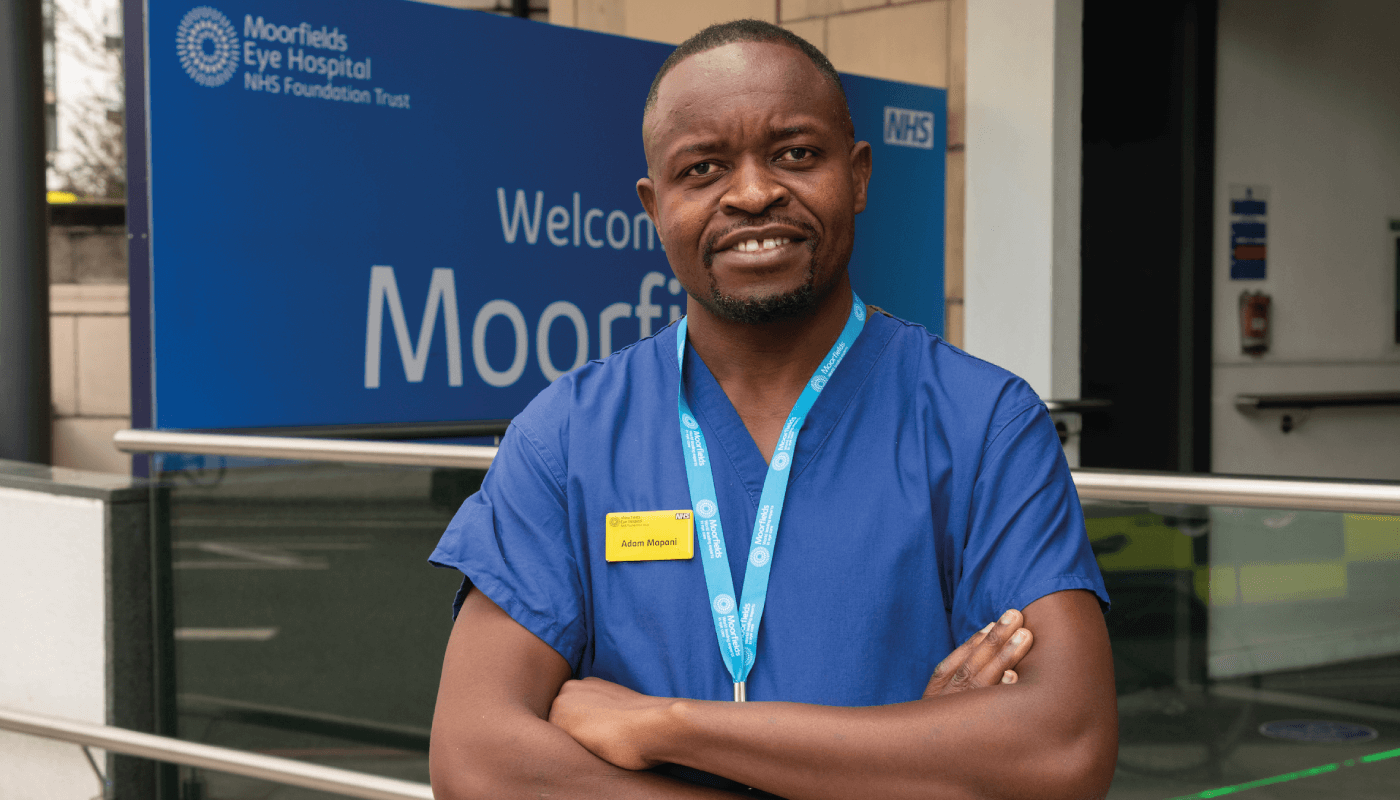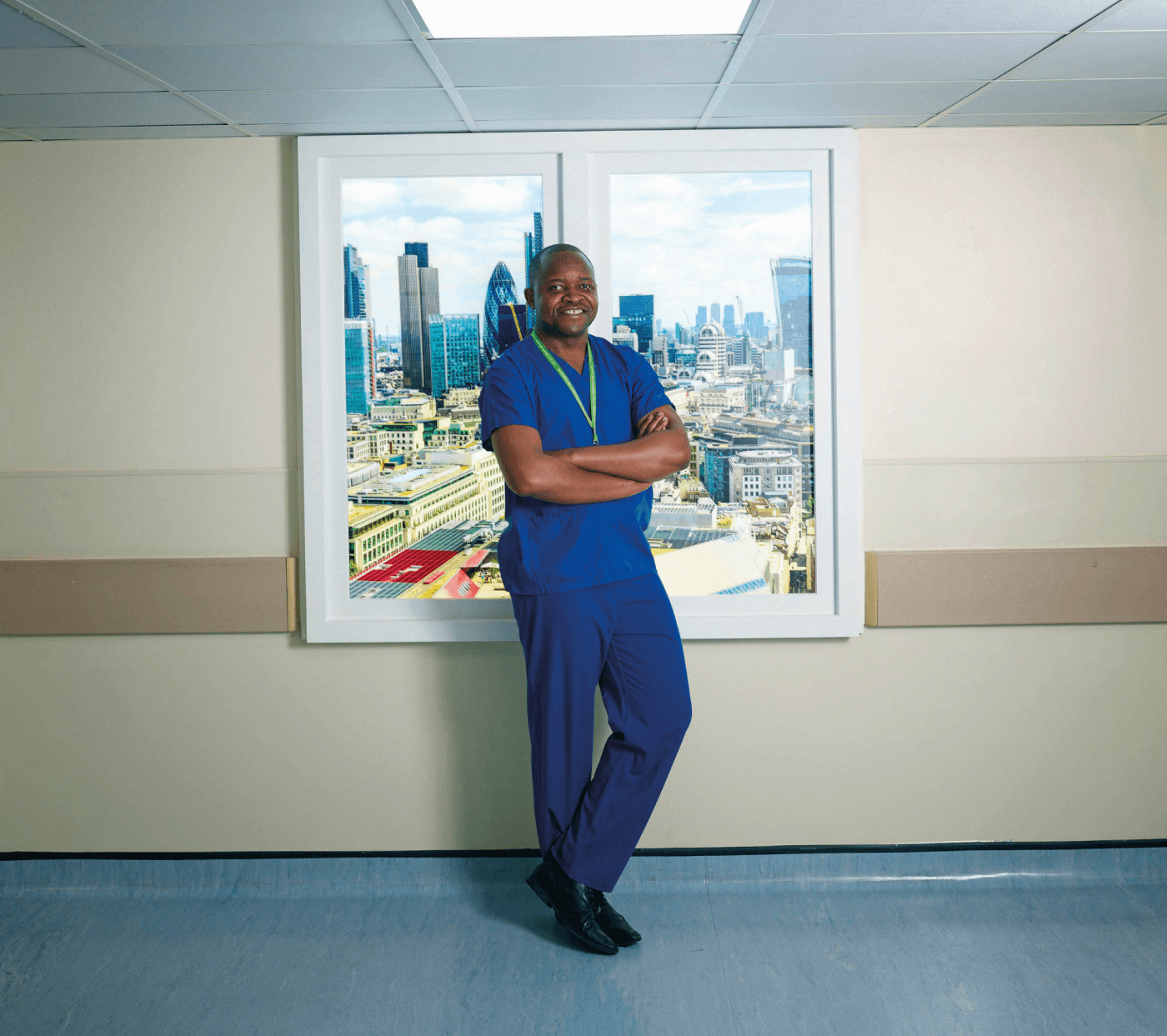
How did you envisage your career path?
I have always imagined myself in a career where I could make an impact on lives. Before embarking on my ophthalmology journey, I considered specializing in diabetes, with the ambition of becoming a diabetes nurse consultant.
So how did you end up in ophthalmology?
My parents came to the UK for my graduation in 2002 – and it coincided with them both having eyesight problems, for which I took them to an optician. All they needed was prescription glasses, which was a relief – and which made a lasting impression on me as a significantly positive experience that transformed their quality of life. It inspired me to pursue a career in ophthalmology, so that I would also be in a position to contribute to society and similarly transform other peoples’ lives. My ambition was further ignited when I visited Moorfields Eye Hospital while accompanying a diabetic patient to a routine eye appointment.
What led to you becoming the first-ever nurse consultant in ophthalmology at Moorfields?
This followed a period of extensive training and development as an advanced nurse practitioner to become the lead medical retina nurse. From there, I set up the nurse-led clinics in the medical retina service. I nurtured and developed the medical retina team through training and education, and I forged strong support networks and mentorship from consultant colleagues and senior management. Having worked in the medical retina service for 11 years, July 2014 was a significant milestone in my career – the day I became the first-ever nurse consultant at Moorfields! I hope that being a pioneer in this role will inspire my nursing colleagues within and outside Moorfields to become future clinical leaders.
How did you get involved in training nurses and AHPs to deliver intravitreal injections?
When anti-VEGF injections were licensed by NICE in 2008, it placed an extra burden on the already-stretched medical retina service. There were so few trained ophthalmologists to deliver these new sight-saving therapies and meet the demands they created. I saw this crisis as an opportunity to use nurses and other allied healthcare professionals (AHCPs) to bridge the gap in service and demand. I began to advocate with policymakers to support this initiative with training for nurses and AHCPs. I was one of the first nurses to carry out intravitreal injections with the pioneering service established in 2012 at Moorfields. We successfully implemented the nurse-led intravitreal injection service across the Trust. This led to influencing policymakers at the national level and, to a certain extent, even globally.
I received an avalanche of inquiries about how we set it up. Colleagues worldwide wanted to know what we had done and how they could do it, too. Because of this huge level of interest, I developed a training program with my colleagues, both outlining our legacy and sharing our success story – demonstrating safety and positive patient experiences. Since establishing the course in 2014, we have trained more than 1,200 ophthalmic nurses and other AHCPs – this figure is at least two-thirds of the total number of practitioners who currently administer intraocular injections in the UK. The global outreach has given the course the international recognition needed to promote non-medical staff delivering injections. There is still work to be done in advancing practice outside the delivery of intravitreal injections – and nurses and AHCPs can play an integral role in other clinical pathways as well.

What other eye care projects have you taken part in?
My passion for eye care is driven by the fact that people’s sight matters so much. Building on my many years of experience working in ophthalmology, combined with my connection to world-renowned clinical leaders, I decided that I wanted to work in Africa (to give back to Zimbabwe, my country of birth). My colleagues and I volunteered our time through Abalon Trust, an international eye charity that provides eye care in Africa and the Caribbean. I made trips as a volunteer at camps in Zimbabwe, Kenya, and Uganda delivering eye care to marginalized and underserved communities. I also wanted to make a difference to nurses in the communities in which I worked by empowering them through education and development.
Did the pandemic change how you work?
The pandemic has significantly changed our work. In the first months, we had to adapt to new ways of working, restricting the number of patients we could see face-to-face and managing the psychological implications of the pandemic – mainly fears and anxiety – in staff, patients, and carers. When services resumed, we had a significant number of patients coming through our digital hubs. The backlog COVID-19 caused has now created extra demands in the service.
Tell us about your work promoting COVID-19 vaccinations in African communities in the UK?
I have had the privilege of working with African communities in the UK to address hesitancy and some of the myths associated with COVID-19 vaccines. Hesitancy about COVID-19 vaccines is disproportionately high in among Black, Asian and minority ethnic (BAME) groups despite the significant impact of COVID-19 in these populations. Coming from lived experience, I was uniquely placed to support the uptake of COVID-19 vaccines for people with links to African and Caribbean countries and the diaspora. Alongside senior BAME leaders in the National Health Service, pastors, and community leaders, we became a voice challenging many of the myths around the COVID-19 vaccine. This was extremely important to prevent people in the most vulnerable communities from missing out on adequate COVID-19 protection.
How does it feel to receive the honors you’ve been given?
In 2020, I was truly humbled to be honored by the UK Prime Minister as an inspirational BAME leader – I was invited to 10 Downing Street (residence and office of the Prime Minister) in recognition of my work in ophthalmology. I was then overjoyed to learn that I had also been awarded an MBE by the Queen for my contribution to ophthalmology services. It is such an honor, especially among my many talented and deserving colleagues in the field.
What gets you out of bed in the morning these days?
The desire to make a difference and positively impact patients, colleagues, and wider society keeps me going!
The best part of my job is getting to know my patients, interacting with them, and delivering care that preserves their sight and makes a difference to their quality of life. I also have a zeal for problem-solving – while providing leadership and mentorship to my colleagues, both internally and externally. The worst part is when time with a patient is limited, making it more difficult to deliver care to a level that I feel is adequate. I am proud that through my international role as a guest key note speaker, and my leadership during the roll out of advanced practice, has made an impact to people’s lives – inspiring many in the 15 countries that I have travelled to.
Do you have any personal missions for the next 10 years?
My passion for supporting others extends to mentoring. I am committed to the development of future leaders in eye care and patient care through mentorship, coaching, and leadership. I am now in my final year of my Executive MBA Studies at Warwick Business School, UK, and I hope to use what I’ve learned to provide better leadership.
What advice would you give to people who are following in your footsteps?
Find an early definition of success that is relative to you, find a mentor, and never compare your progression to others. My philosophy is, “Do what you love, and you will love what you do.”
What makes you happy outside work?
Quality family time is very important to me. I like to work on my physical fitness through jogging, walking with my wife and daughters, or cycling. In my downtime, I listen to music and watch sports – football and rugby – and I am slowly learning to play golf!
